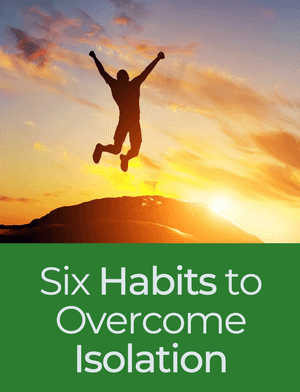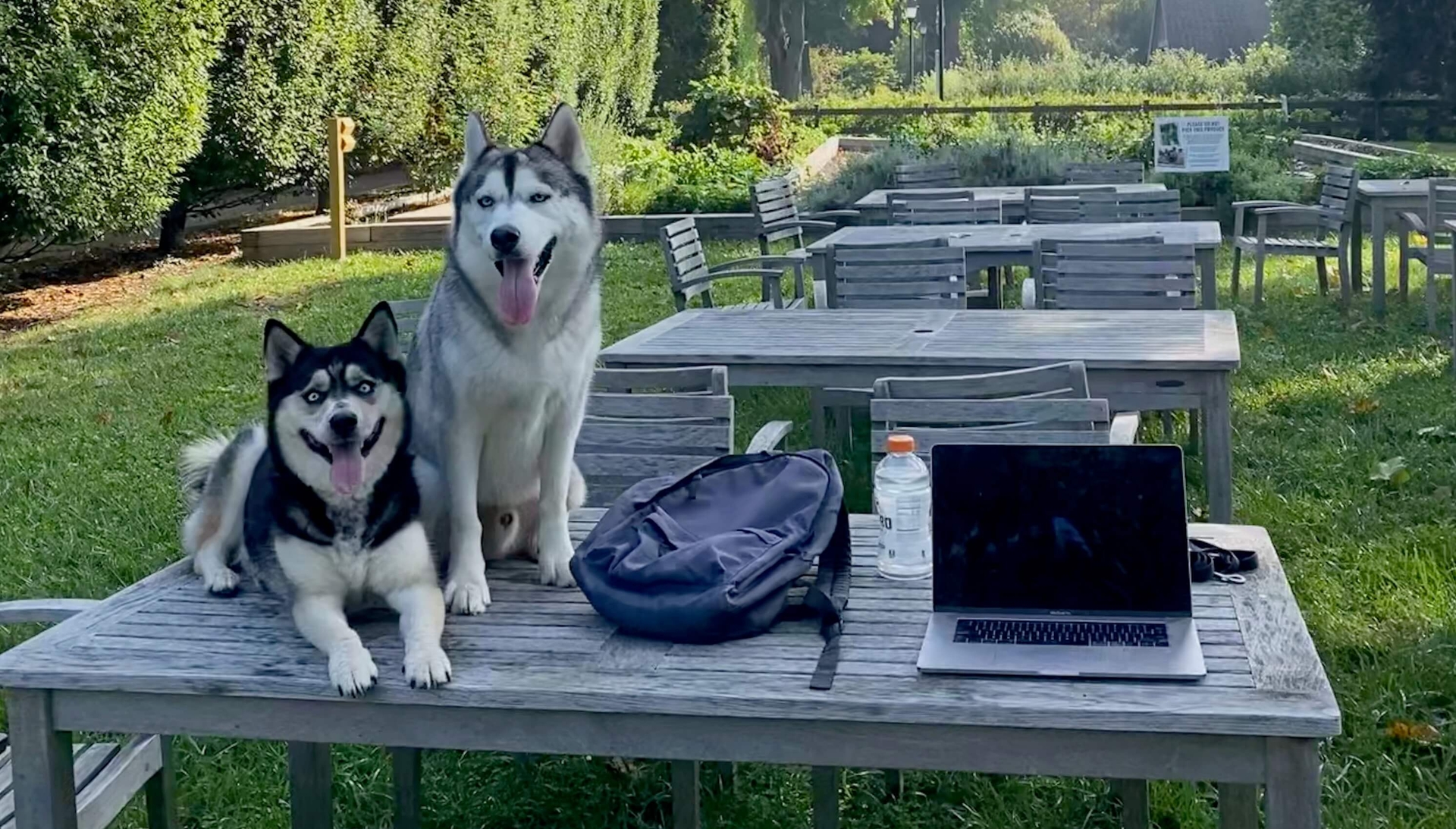
Get the Six Habits for Overcoming Isolation Guide for free


If you're a software developer (or engineer, for that matter), chances are you've been working remotely for a while now. Technology has ushered in an age where the vast majority of knowledge workers can perform their core responsibilities from home.
It's great to be able to set your own hours and avoid the dreaded rush-hour traffic, but remote work has downsides that go beyond domestic distractions and blurred boundaries.
Listen to the podcast version here
I remember having to work on-site for Nasdaq in 2019 and feeling utterly trapped. I would walk to a nearby park or the gym during my lunch breaks just to get outside.
Once I switched to a smaller company with a remote work culture, my well-being skyrocketed. My CEO gifted me Rework, which changed how I look at company culture at a fundamental level. But I've also experienced the downsides of remote work, particularly during the COVID pandemic when no one felt safe interacting.
Working from home affects you and your colleagues. With the proper awareness, this can be a good thing. However, the reality is that there is less spontaneous social contact between workers, something we are very much accustomed to by nature.
Research has found that digital channels such as Zoom don't trigger the entire range of physiological responses required for building trust and genuine connection. Only in-person interactions can do so - much like only nutrient-dense meals can nurture your body.
Digital connections lacking depth can result in fixed and siloed social networks. You may experience a reduced sense of belonging and increased social isolation. In studies conducted almost two decades ago - long before COVID-19, researchers found that working from home increased loneliness over office work by 67%.
Since the first quarter of 2020 remote work trends and expectations have drastically changed. Employers all around the world are embracing flexible schedules.
According to an Owl labs study, 16% of US-based companies are now fully remote. The same survey found that six out of ten workers aged 22 to 65 work remotely at least occasionally. A separate study found that working from home is a relatively new experience for those with jobs that can be done remotely – almost six out of ten people say they rarely or never worked from home prior to the pandemic.
While remote technologies are becoming increasingly effective at allowing you to perform your responsibilities at home, they are inadequate to meet our innate human need for genuine interactions.
In the first study to examine the effects of Zoom since the pandemic’s onset, psychologists at the Universities of California and Cambridge surveyed over a hundred young adults on their mental health and found that “there was no association between the frequency of virtual social interactions and well-being.”
If the problem with working from home is a lack of genuine connection, then the obvious answer is ensuring you have enough social contact outside work. However, that is easier said than done.
Wanting to make friends doesn't magically create them; it all starts with being intentional. Different personalities can have unique struggles too.
Extroverts struggle to make close friends because, despite appearing talkative, they might not go deep. Introverts struggle because their energy comes from being alone.
Those with social anxiety struggle because they are in their head and second guess themselves. Below I will share some tips and strategies on how I managed to overcome my struggles.
Adjacent friends are the people you see all the time but rarely talk to. They're at the same parties and have the same friends, but you've never had a one-on-one conversation for some reason. Maybe you're too shy, or maybe they just don't seem that interesting. But friends of friends can be a great way to expand your social circle, you already have something in common with them, so it's easier to start a conversation.
Because you see them all the time, you can get to know them gradually without feeling like you're putting yourself out there too much. Next time you see an adjacent friend at a party, why not initiate a conversation? You might be surprised at how much you have in common. Once you have a baseline established, ask them to meet up but give them a way out when you do so they don't feel pressured.
Maybe this advice sounds cumbersome to you. Reading it makes me feel slightly awkward, but I can share from personal experience that it works, and growth happens outside your comfort zone.
When I met an adjacent friend four years ago while living in Denver, I had no idea that friendship would lead to the incredible developer role I have today. Similarly, after relocating to San Diego, I met friends of friends I call family today. They showed me around the city, took me climbing and surfing, gave me a safe space to explore myself, and helped me acquire a duplex well under market value.
Adjacent friends who became my friends increased my mental, physical, spiritual, and financial well-being. Those people are out there for you too, you just have to get comfortable finding them.
In today's fast-paced world, we're always rushing from one place to the next, and often we're so focused on our phones that we don't even notice the people around us. You may not realize that by doing this, you're missing out on a lot of opportunities for connection. You may see the same people every day, such as the barista at the coffee shop, and if you say hello or have a small conversation, that’s a hotbed for a relationship.
A few years ago, I lived in a beach town; I could go right out the back gate into the ocean carrying a surfboard. One night I walked down to catch the sunset and struck up a conversation with a stranger. To our amazement, we discovered we had both been born and raised in the Netherlands.
We never became very close, as he was recalled by his Dutch employer shortly after, but we did surf together a few times and were able to speak in our native language. This was very comforting during the pandemic, and I deeply value those moments in hindsight.
Starting a conversation with strangers may not be for everyone. You can also try joining a meetup group for a hobby or skill you're interested in. It's a great way to meet like-minded people while doing something you enjoy.
Try going at least two to three times to get a decent feeling for the dynamic of the group. Studies have shown that to build a relationship, you have to see people regularly; weekly tends to work best.
Focus on the people there that make you feel most at ease and find out how you can help them. Doing small favors for others or just showing up for them will build trust, and trust leads to friendships.
Here are some suggestions I have tried or heard good things about. They all link to local groups in San Diego, but you can look for commonalities in your area.
Class ideas:
Meetup & club ideas:
Going to the React Denver Group in 2018 taught me a great deal about the ecosystem and got me noticed by those looking to hire.
The process of networking, interviewing, and mostly getting rejected laid a solid foundation for continuous learning. Those experiences enabled me to build the career capital and freedom I have today.
Don't change who you are to appease others. If you do, you may grow a wider social network, but it will exhaust much quicker because it is shallow.
Don't be overly aggressive and don't expect immediate results. Coming on too strong will turn others away, and research has shown it may take 10-15 conversations before you feel like you're friends.
Don't brag or show off. Many of us are lucky to live in a time where our skills are valued and appropriately compensated. Showing off isn't going to make you feel better in the long run. Invest in your health, mind, and relationships, or you will attract the wrong people.
Do
Do say yes. When you’re invited to an event, accept the invitation. Return the favor by inviting others to gatherings they might enjoy.
Do take the initiative. Everyone enjoys being invited and if they aren't free, just try again later.
Do start the conversation and show genuine interest in someone. Ask open-ended questions and make them feel heard - everybody likes talking about themselves so it's an easy icebreaker.
Do be kind and positive; everybody enjoys having good energy around them. Smile, make eye contact, and share personal things without going overboard.
Do a small favor and keep the momentum going. Acts of kindness lead to connection, trust, and familiarity. Little gestures make people feel valued and important.
Are you ready to get out of your comfort zone? If you feel like you need some support, send me a message and keep me up to date on your journey. I would love to stay in touch with you.
https://www.nature.com/articles/s41562-021-01196-4
https://www.mdpi.com/1660-4601/18/10/5149/htm
https://onlinelibrary.wiley.com/doi/10.1111/1468-005X.00063
https://www.theatlantic.com/family/archive/2021/04/zoom-remote-work-loneliness-happiness/618473/
https://www.apollotechnical.com/statistics-on-remote-workers/
https://www.webmd.com/balance/features/how-to-make-new-friends
https://www.raywenderlich.com/862-top-8-programmer-hobbies
https://www.thecdi.net/write/Documents/Wales%20Forum/Sandi_Mann_Holdworth.pdf

Get the Six Habits for Overcoming Isolation Guide for free